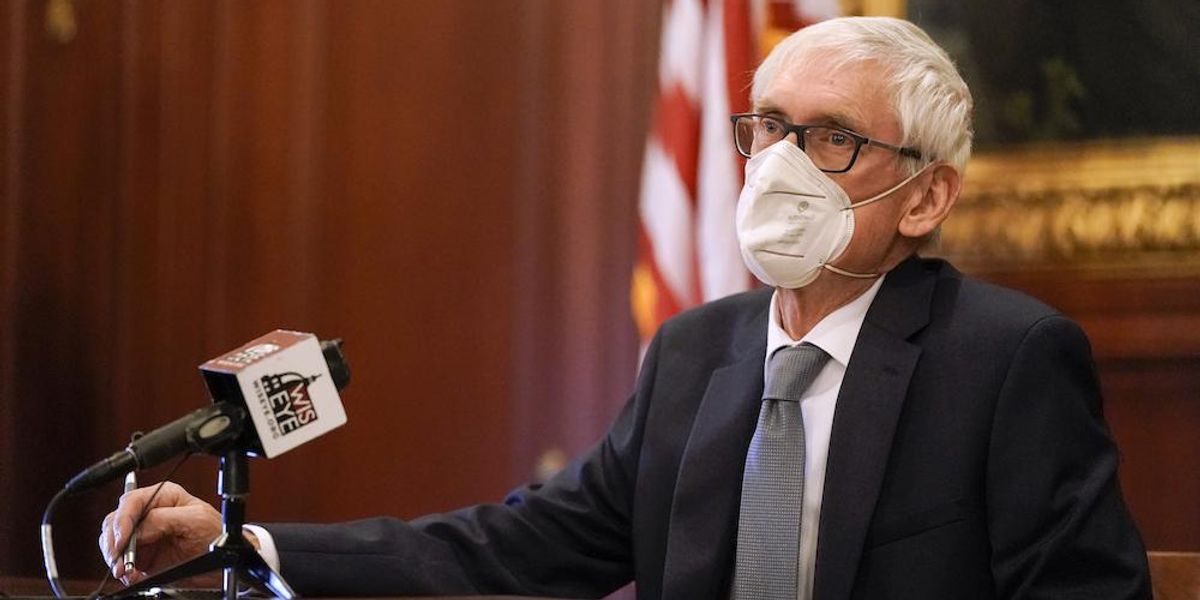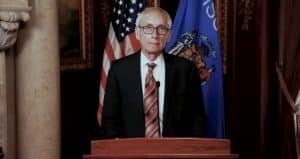The Wisconsin Supreme Court struck down Democratic Gov. Tony Evers’ statewide mask mandate Wednesday. The court said Evers overstepped his authority when he used back-to-back emergency orders to enact his ongoing unilateral mask mandate.
What did Evers do?
Evers has issued multiple mask mandates using his emergency powers. Republicans have long claimed the governor has abused his power with the repeated mandates. In fact, in February, the Republican-controlled Wisconsin General Assembly repealed Evers’ emergency order and statewide mask mandate, citing Evers’ abuse of emergency declarations.
Within an hour of the repeal, Evers’ signed a new emergency order mandating mask-wearing across the state.
Republican leaders issued a statement saying that the governor “has abused his limited authority for far too long by repeatedly issuing unlawful orders beyond his 60-day emergency powers. The Assembly and Senate voted to end the executive overreach and restore our constituents’ voice in the legislative process.”
It appears that the state Supreme Court agrees.
The Associated Press reported that the court ruled 4-3 that Evers exceeded the powers of his office by repeatedly issuing 60-day mask-mandate orders. The justices ruled that a health emergency order issued by the governor is good for only 60 days and cannot be extended without legislative action.
Justice Brian Hagedorn, in his decision for the majority, wrote, “The question in this case is not whether the governor acted wisely; it is whether he acted lawfully. We conclude he did not.”
In a concurring opinion highlighted by WITI-TV reporter Jason Calvi, Justice Rebecca Bradley called out Evers’ attempt to wield “unilateral, unchecked power” (emphasis added):
Under Governor Evers’ interpretation, the constitutional separation of powers between the executive and legislative branches would collapse for the duration of any public health emergency. Every 60 days, so long as the underlying cause of the emergency persists, the executive could declare another state of emergency, granting the Governor the extraordinary powers … indefinitely. Such unilateral, unchecked power was anathema to the framers of our constitutions.
“Such unilateral, unchecked power was anathema to the framers of our constitution,” Justice Rebecca Bradley writes… https://t.co/AYU6Vfyg5B
— Jason Calvi (@Jason Calvi)1617201020.0
The court’s minority apparently has no problem with the governor’s unilateral extension of power. Dissenting Justice Ann Walsh Bradley’s dissent, as quoted by the AP, said in part:
This is no run-of-the-mill case. We are in the midst of a worldwide pandemic that so far has claimed the lives of over a half million people in this country. And with the stakes so high, the majority not only arrives at erroneous conclusions, but it also obscures the consequence of its decision. Unfortunately, the ultimate consequence of the majority’s decision is that it places yet another roadblock to an effective governmental response to COVID-19.
HotAir’s Ed Morrissey responded to Bradley’s dissent by pointing out, “That would mean that there were no functional limits on singular executive rule in Wisconsin, except elections. And even then, those emergency powers could be used to postpone or cancel elections, especially in a pandemic.”
Not Evers’ first COVID court loss
This isn’t the first hit the courts have delivered to Evers’ COVID orders.
In May, the state Supreme Court scrapped the governor’s unilateral stay-at-home orders, which one justice described as “the very definition of tyranny.”
And last October, the AP noted, a state appeals court blocked Evers’ imposed limits on indoor gatherings.






